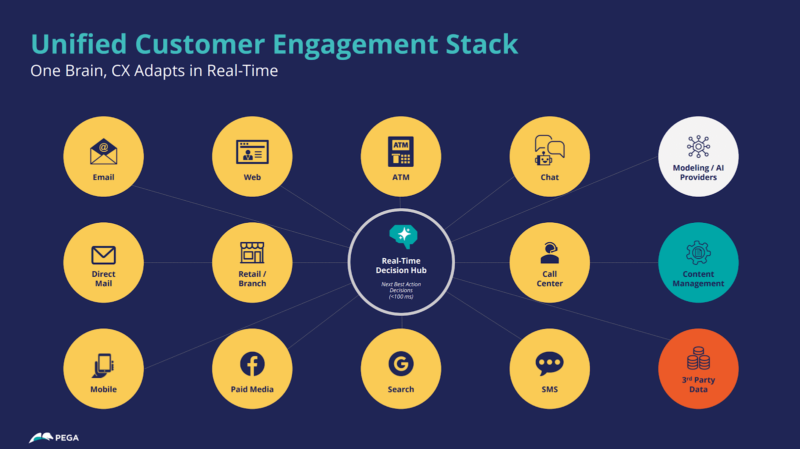Opinions expressed in this article are those of the sponsor. Search Engine Land neither confirms nor disputes any of the conclusions presented below.
Why empathy is about meeting the customer on their terms
Centralizing decisions and basing actions on context is key to delivering real value for your customers.

It may be a hard truth for us best-intentioned marketers to swallow, but two-thirds of customers believe that marketers do not care about their needs.
That’s according to a survey of 5,000 individuals by Pega. And when you look at what marketers face, it is easy to see how that kind of sentiment takes root.
“Think about the scale of your business,” said Andrew LeClair, senior product marketing manager at Pegasystems. “You’re trying to manage literally billions of interactions, with millions of customers, across hundreds and hundreds of programs, on dozens and dozens of channels — and that’s a lot of complexity. And unfortunately, that complexity leaves us exposed. There’s not a lot of chances for us to get it right, but there’s a ton of opportunities for things to go wrong, and it only takes one poor experience and the customer is out the door.”
It’s a repeating cycle for many marketers as the demands of conversion, and the technologies at our disposal to create blast after blast, cement this idea that marketers don’t care.
But according to LeClair, a more empathetic approach may not only create better faith with your customers, it may also be better for business.
“Acting with empathy is all about understanding somebody else’s feelings, their thoughts, their emotions, their context or situation, and then being able to adapt to that within a given conversation,” said LeClair, speaking at the recent MarTech Conference. “And that seems pretty straightforward if you’re talking about a human that’s engaging with another human, but when it’s us as a brand trying to do this at scale, we really struggle.”
So here’s how we can turn it around.
Centralize decisions
As marketers know, the universe of martech is vastly expanding as there are now more than 8,000 solutions available. But while all of that tech creates a host of ways to engage with your customers, that doesn’t mean you should overdo it.
“That’s 8,000 disconnected, siloed applications, each of which has their own brain, their own rules, data models, and unique ways of understanding, interacting, and engaging with customers,” said LeClair. “And even if they’re from the same vendor, we all know that none of these were built to work together. They were each built to help businesses like ours sell products to customers in big batches, in large segments. They weren’t designed to be agile and help us solve customers’ problems during times like these.”
Instead, LeClair said it is crucial to install a central decision authority that sits at the center of all usable engagement channels and collects and analyzes the data. It’s the difference between working with 8,000 “disconnected brains” or just one.
“And what this brain does is based on all the data it’s collected is look at each customer, in each unique moment, and determines what’s their context, what’s their situation. And is there anything that we can do that’s going to add value? Is there a next best action for us to take? And we figure all of that out in real-time, using things like AI, adaptive models, machine learning, then deliver that next best action back out across any of these channels.”

P x V x L
That idea of executing on the next-best-actions is really key if your organization is going to be able to deliver a marketing strategy that is more empathetic to your customers but also works at scale for your business.
The key there, says LeClair, is in understanding the propensity that a customer has to accept an offer, that value that will bring to your business, all within the context of the given situation.
“The next best action is simply the one with the highest total P [propensity] times V [value] times L [lever],” he said.
LeClair gave the example of a customer “on our app during a lunch break clicking on a bunch of pages.” Those clicks are streaming directly into that centralized brain, the decision hub, which is re-scoring the profile in real-time to see if that activity is suggesting any change to the customer’s current state — like if they may be becoming a retention risk.
“Then, what we can do is instantly recommend our next best retention offer and surface that right in the mobile channel as she’s online,” he said.
But perhaps that same customer a bit later purchases something, which giver the marketer a new opportunity to suggest something that pairs with that purchase.
“The second that purchase data comes in we rescore her again. P times V times L, and now her new next best action isn’t that retention plan. Instead, we switch to a rewards offer,” he said.
“If we’re going to engage with empathy, it’s not enough just to know what to do. We’ve then got to get that decision out to the customer during their moment of need, and then be able to adapt and shift that experience in real-time in order to ensure that it’s always relevant to their current situation.”
Showing we care
While creating a centralized decision authority and leveraging it to execute next-best-actions that are relevant to the customer can go a long way towards showing more empathy as a marketer, sometimes it is important to remember who is really in charge of that relationship.
“What we need to do is engage the customer on their terms,” said LeClair. “They’re the ones that are in control. It’s not about when we feel like talking to them. It’s constantly listening, constantly monitoring their context and engaging during their moments of need only when we can add value.”
Related stories
New on Search Engine Land
